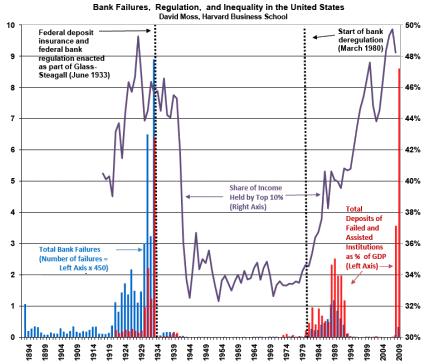… It is easy to make too much of this, and a few conservatives have done so in seeking to dismiss the importance [or even existence] of the Great Divergence. Let’s look at their arguments.
- Inequality is good
- Income doesn’t matter
- Inequality doesn’t create unhappiness
- Quality of life is improving
- Inequality isn’t increasing
What is the ideal distribution of income in society? I couldn’t tell you, and historically much mischief has been accomplished by addressing this question too precisely. But I can tell you this: We’ve been headed in the wrong direction for far too long.
what I think...

“This bill is the most important legislation for financial institutions in the last 50 years. It provides a long-term solution for troubled thrift institutions. … All in all, I think we hit the jackpot.” So declared Ronald Reagan in 1982, as he signed the Garn-St. Germain Depository Institutions Act. He was, as it happened, wrong about solving the problems of the thrifts. On the contrary, the bill turned the modest-sized troubles of savings-and-loan institutions into an utter catastrophe. But he was right about the legislation’s significance. And as for that jackpot — well, it finally came more than 25 years later, in the form of the worst economic crisis since the Great Depression. For the more one looks into the origins of the current disaster, the clearer it becomes that the key wrong turn — the turn that made crisis inevitable — took place in the early 1980s, during the Reagan years.
Attacks on Reaganomics usually focus on rising inequality and fiscal irresponsibility. Indeed, Reagan ushered in an era in which a small minority grew vastly rich, while working families saw only meager gains. He also broke with longstanding rules of fiscal prudence. On the latter point: traditionally, the U.S. government ran significant budget deficits only in times of war or economic emergency. Federal debt as a percentage of G.D.P. fell steadily from the end of World War II until 1980. But indebtedness began rising under Reagan; it fell again in the Clinton years, but resumed its rise under the Bush administration, leaving us ill prepared for the emergency now upon us. The increase in public debt was, however, dwarfed by the rise in private debt, made possible by financial deregulation. The change in America’s financial rules was Reagan’s biggest legacy. And it’s the gift that keeps on taking…
But there was also a longer-term effect. Reagan-era legislative changes essentially ended New Deal restrictions on mortgage lending — restrictions that, in particular, limited the ability of families to buy homes without putting a significant amount of money down. These restrictions were put in place in the 1930s by political leaders who had just experienced a terrible financial crisis, and were trying to prevent another. But by 1980 the memory of the Depression had faded. Government, declared Reagan, is the problem, not the solution; the magic of the marketplace must be set free. And so the precautionary rules were scrapped. Together with looser lending standards for other kinds of consumer credit, this led to a radical change in American behavior.
We weren’t always a nation of big debts and low savings: in the 1970s Americans saved almost 10 percent of their income, slightly more than in the 1960s. It was only after the Reagan deregulation that thrift gradually disappeared from the American way of life, culminating in the near-zero savings rate that prevailed on the eve of the great crisis. Household debt was only 60 percent of income when Reagan took office, about the same as it was during the Kennedy administration. By 2007 it was up to 119 percent. All this, we were assured, was a good thing: sure, Americans were piling up debt, and they weren’t putting aside any of their income, but their finances looked fine once you took into account the rising values of their houses and their stock portfolios. Oops.
Now, the proximate causes of today’s economic crisis lie in events that took place long after Reagan left office — in the global savings glut created by surpluses in China and elsewhere, and in the giant housing bubble that savings glut helped inflate. But it was the explosion of debt over the previous quarter-century that made the U.S. economy so vulnerable. Overstretched borrowers were bound to start defaulting in large numbers once the housing bubble burst and unemployment began to rise.
These defaults in turn wreaked havoc with a financial system that — also mainly thanks to Reagan-era deregulation — took on too much risk with too little capital. There’s plenty of blame to go around these days. But the prime villains behind the mess we’re in were Reagan and his circle of advisers — men who forgot the lessons of America’s last great financial crisis, and condemned the rest of us to repeat it.

Sorry, the comment form is closed at this time.